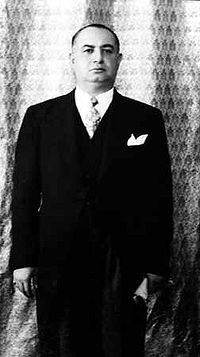Husni al-Za'im President
Husni al-Za'im (1897 – August 14, 1949) (Arabic: حسني الزعيم) was a Syrian military man and politician. Husni al-Za'im, whose family is of Kurdish ancestry, had been an officer in the Ottoman Army. After France instituted its colonial mandate over Syria after the First World War, he became an officer in the French Army. After Syria's independence he was made Chief of Staff, and led the Syrian Army into war with the Israeli Army in the 1948 Arab-Israeli War. The defeat of the Arab forces in that war shook Syria and undermined confidence in the country's chaotic parliamentary democracy.On April 11, 1949, al-Za'im seized power in a bloodless coup d'état. The coup, according to declassified records and statements by former CIA agents, was sponsored by the United States CIA. Syria's President, Shukri al-Kuwatli, was briefly imprisoned, but then released into exile in Egypt. Al-Za'im also imprisoned many political leaders, such as Munir al-Ajlani, whom he accused of conspiring to overthrow the republic. The coup was carried out with discreet backing of the American embassy, and possibly assisted by the Syrian Social Nationalist Party, although al-Za'im himself is not known to have been a member. Among the officers that assisted al-Za'im's takeover was Adib al-Shishakli and Sami al-Hinnawi, both of whom would later become military leaders of the country.Al-Za'im's takeover, the first military coup in the history of Syria, would have lasting effects, as it shattered the country's fragile and flawed democratic rule, and set off a series of increasingly violent military revolts. Two more would follow in 1949.While his rule was relatively mild, with no executions of political opponents and few arrests of dissenters, al-Za'im quickly made enemies. His secular policies and proposals for the emancipation of women through granting them the vote and suggesting they should give up the Islamic practice of veiling, created a stir among Muslim religious leaders (Women's suffrage was only achieved during the third civilian administration of Hashim al-Atassi, a staunch opponent of military rule). Raising taxes also aggrieved businessmen, and Arab nationalists were still smouldering over his signing of a cease-fire with Israel, as well as his deals with US oil companies for building the Trans-Arabian Pipeline. He made a peace overture to Israel offering to settle 300,000 Palestinian refugees in Syria, in exchange for border modifications along the cease fire line and half of Israel's Lake Tiberias. Settling the refugees was made conditional on sufficient outside assistance for the Syrian economy. The overture was answered very slowly by Jerusalem and not treated seriously.Lacking popular support, al-Za'im was overthrown after just four and a half months by his colleagues, al-Shishakli and al-Hinnawi. As al-Hinnawi took power as leader of a military junta, Husni al-Za'im was swiftly spirited away to Mezze prison in Damascus, and executed along with Prime Minister Muhsin al-Barazi.
Search
Politician
| military operations | |
|---|---|
| military branch | |
| office | Prime Minister of Syria |
| service start | 1917 |
| service end | 1949 |
| successor |
